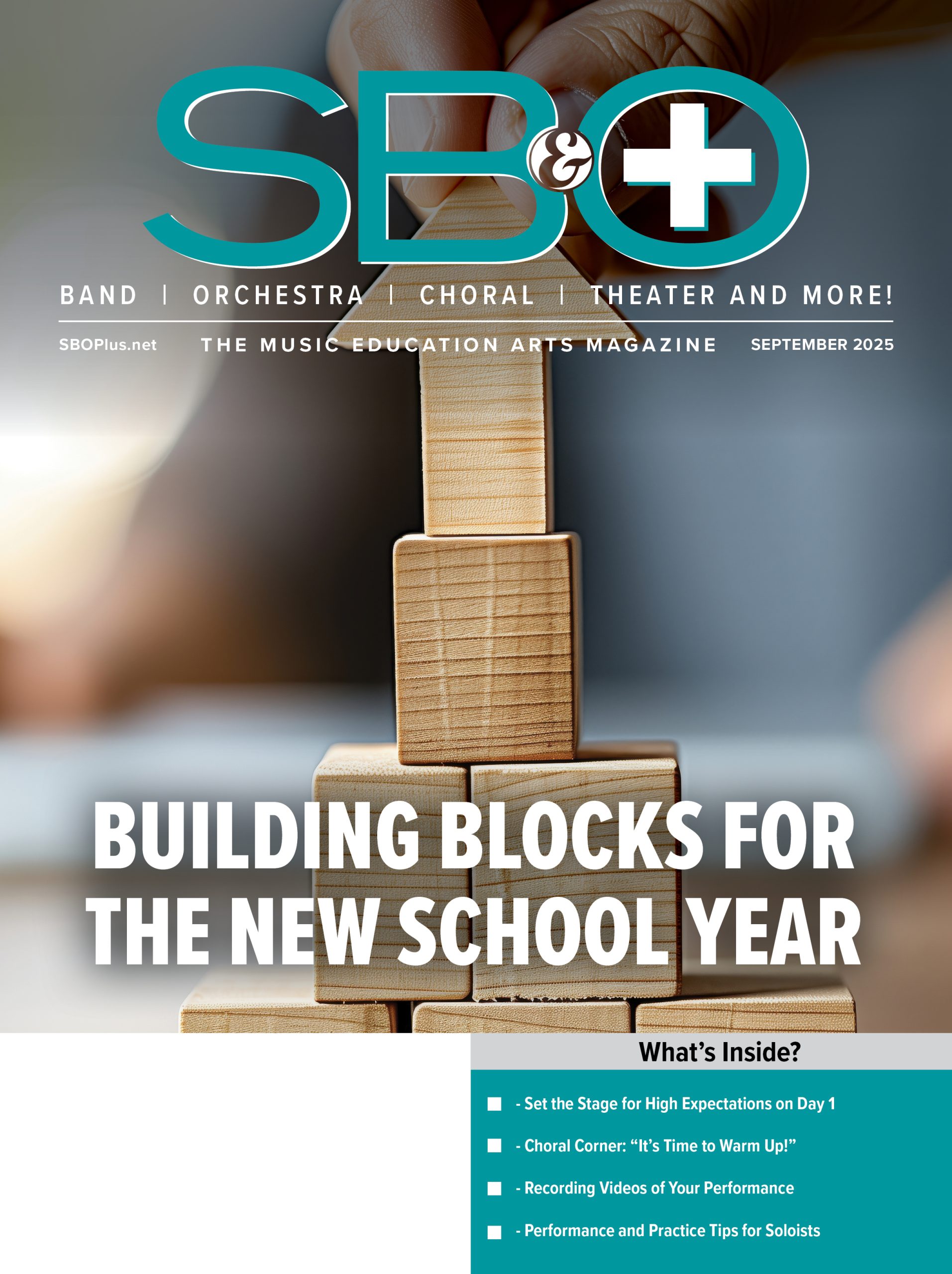Establishing a positive classroom culture in a music education environment demands more than effective lesson planning and classroom management; it requires an intentional, collaborative effort between educators and students. Let’s explore a model grounded in three essential pillars—Gaining Student Support, Creating Influence, and Building Credibility—to foster a culture of respect, engagement, and artistic growth.
Music classrooms are uniquely positioned to foster creativity, self-expression, and community. Unlike traditional academic settings, music education thrives on interpersonal dynamics, shared experiences, and mutual respect. Therefore, a positive classroom culture is essential not only for student well-being but also for musical growth. This comes from an emphasis on collaboration between students and teachers, anchored by three interdependent pillars: Support, Influence, and Credibility.
Pillar 1: Gaining Student Support
Students must feel seen, heard, and valued. It involves building emotional safety, showing empathy, and fostering mutual trust. In a music classroom, where collaboration and vulnerability are central, student support isn’t just helpful—it’s essential for success.
Strategies:
Create a Culture of Belonging:
Treating students like valued members of a family builds a sense of belonging and shared purpose. When students feel their presence and contributions matter, they take greater ownership of group goals. Simple gestures—such as learning each student’s name, asking about their interests, or making time for one-on-one conversations—can help solidify this connection.
Show Appreciation and Celebrate Success:
Recognizing individual and group achievements fosters motivation and morale. Consider hosting a “Section of the Week” award, organizing appreciation days, or publicly acknowledging improvement and effort. Saying “thank you” or offering sincere praise reinforces that each student’s contributions are vital.
Empower Senior Students and Build Mentorship:
Respecting the experience of senior members by giving them added responsibility fosters a culture of leadership. Assign senior members as mentors to new students, reinforcing a community model where peer support enhances skill development and group cohesion.
Understand Student Needs and Provide Emotional Support:
Every student wants happiness, friendship, a sense of security, and peace of mind. Leaders must be attuned to these needs and create conditions to nurture them. By ensuring students feel safe, valued, and comfortable in the classroom environment, educators pave the way for authentic learning and expression.
Keep Students Informed and Engaged:
Transparency and communication are essential. Keeping students aware of upcoming events, changes, or group goals ensures they feel involved and respected. Boredom and disengagement often stem from a lack of purpose—ensure activities are fun, meaningful, and student-centered.
Provide Structure and Safety:
Build a support system where students never feel isolated or left to “fend for themselves.” This could mean assigning leadership buddies, encouraging collaboration in sectionals, or simply using inclusive language like “we” and “our.” Reinforce a sense of unity with mottos such as “Hold hands and stick together,” underscoring that no student faces the learning journey alone.
Form a Student Leadership Team:
Establishing a leadership team within the ensemble allows students to take initiative, voice concerns, and contribute to decision-making. Representation from all sections ensures inclusivity and equitable ownership in classroom culture-building.
What is the Impact?
Students who feel supported are more likely to take creative risks, contribute authentically, and persist through challenges. This sense of community turns the classroom into a safe haven—one where collaboration thrives, and students are motivated to work toward shared musical and interpersonal goals.
Pillar 2: Creating Influence
Influence is the teacher’s ability to inspire, guide, and motivate students without relying solely on authority. It emerges from consistency, vision-sharing, and building relationships both in and out of the rehearsal space. In a music classroom, influence is more powerful when it’s earned—not imposed. A teacher’s ability to shape group dynamics, behavior, and enthusiasm hinges on trust and authenticity.
Strategies:
Be a Role Model:
Influence begins with personal conduct. As a leader, your students watch everything you do—from how you react to challenges to how you treat others. Modeling professionalism, integrity, and dedication sets a clear standard for students to emulate.
Demonstrate Good Work Habits and Service-Oriented Behavior:
Always show up prepared, meet deadlines, and maintain high expectations for yourself and your students. Offer help generously, treat students with kindness and patience, and demonstrate good “customer service” by handling concerns respectfully and efficiently.
Respect Policies and Systems:
Upholding school or program policies consistently—not selectively—demonstrates that rules are fair, important, and part of a shared community standard. This fosters student respect for procedures and expectations.
Share the Load:
Influence grows when students see their teacher “doing their share of the dirty work.” Whether it’s stacking chairs after rehearsal or organizing music folders, your willingness to do humble tasks sends a strong message about humility, teamwork, and shared responsibility.
Act Professionally and Build Trust:
Behave in a way so that others can rely on your judgment. A calm, confident, and consistent demeanor encourages students to trust your leadership. Maintaining a positive attitude about the group—even during tough times—reinforces a culture of resilience and optimism.
Encourage Collaboration and Input:
Influence deepens when students feel their voices matter. Seek their input during decision-making, such as choosing concert themes or rehearsal structures. This makes students feel empowered rather than managed.
Be the “Go-To” Person:
Develop your skills and knowledge to the point that students and colleagues view you as a resource. When you’re seen as capable and dependable, your influence grows organically. Sharing your expertise freely builds credibility and a spirit of mentorship.
Cautions When Exercising Influence:
Avoid Manipulation:
Influence should never be coercive. If students sense they are being manipulated, trust erodes. Influence must be rooted in honesty, care, and mutual benefit.
Lead by Example, Not Pressure:
Influence others by living your values and expressing genuine emotion about the group’s success. Your passion for music and the community will resonate more than any directive.
Personality Matters:
A warm, respectful, and approachable personality encourages others to listen and follow. Students are more likely to accept feedback and direction from someone they genuinely like and admire.
Involve the Group:
Shared decision-making doesn’t just distribute responsibility—it also increases commitment and buy-in. When students are part of the process, they are more likely to support and uphold the outcomes.
What is the Impact?
When students view their teacher as a consistent, capable, and emotionally invested leader, they are more inclined to engage, collaborate, and take initiative. Influence is not about power—it’s about connection. And in the music classroom, where expression and trust are paramount, this kind of leadership sets the tone for everything that follows.
Pillar 3: Building Credibility
Credibility stems from professional expertise, consistency, and authenticity. A credible teacher earns respect not just through musical knowledge but through ethical conduct, reliability, and a commitment to student growth. In the music classroom, where students are constantly observing and interacting with their teacher, credibility is one of the most powerful tools for long-term influence and classroom cohesion.
Core Elements of Credibility as a Leader:
The two most important factors in leadership are integrity and trustworthiness. Students—and people in general—want leaders who are ethical and dependable. Credibility must be built daily through consistent actions and honest behavior.
Strategies:
Exemplify Ethical Leadership:
Uphold group rules and expectations consistently. This includes being safe, courteous, and respectful in all interactions. Avoid abusive or inappropriate language, and treat every student fairly, regardless of ability, background, or personality. Ethical leadership also means being honest in communication and transparent in decision-making.
Demonstrate Reliability and Professionalism:
Good attendance, punctuality, and consistent preparation for class send a strong message: this classroom matters. Whether you’re arriving early to tune instruments or preparing detailed rehearsal notes, your behavior communicates your values. Students are more likely to take things seriously when you do.
Produce Quality in Every Task:
Whether it’s a concert, a warm-up activity, or an informal rehearsal, strive to deliver high-quality experiences. Show students that excellence is a habit, not a one-time effort.
Walk the Talk:
There must be clear alignment between what you say and what you do. If you promise to listen to feedback, act on it. If you expect students to be respectful, model that respect in every interaction. One powerful reflective question to use regularly: “If everyone in the band acted like me, what kind of group would this be?”
Be a Problem Solver, Not a Complainer:
Students gain respect for leaders who focus on solutions rather than blame. When challenges arise—missed notes, scheduling conflicts, group disagreements—model calmness, creativity, and collaboration.
Project an Image of Trust:
Your demeanor, tone, and consistency contribute to how trustworthy you appear. Avoid sarcasm that can be misinterpreted, keep sensitive conversations confidential, and show students you have their best interests at heart. A trustworthy leader builds a trustworthy community.
What is the Impact?
Credibility creates a stable, respectful environment where learning and creativity can thrive. When students believe in their teacher’s integrity and consistency, they are more likely to accept feedback, stay motivated, and hold themselves to higher standards. In music education—where collaboration, critique, and emotional expression are daily norms—credibility is not just important; it’s foundational.




























